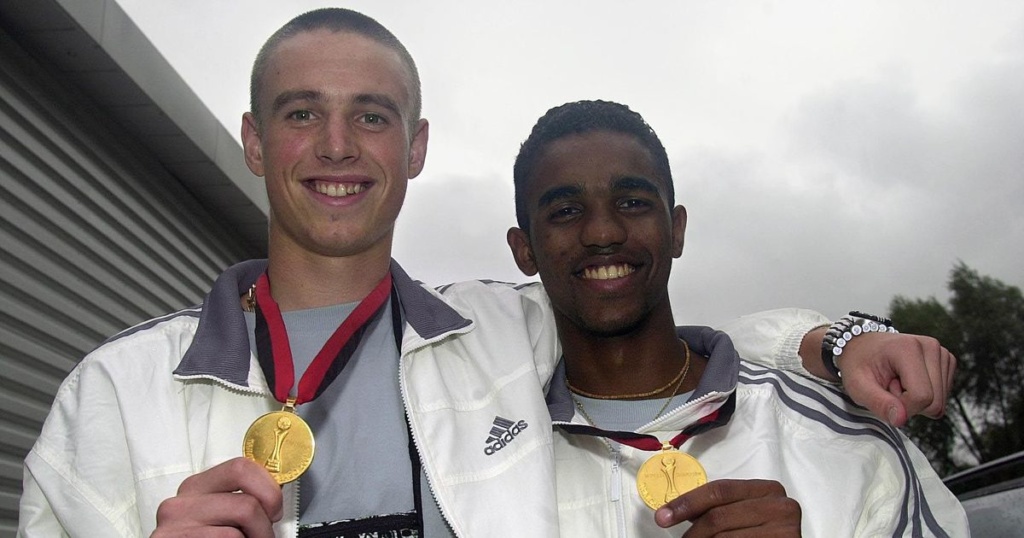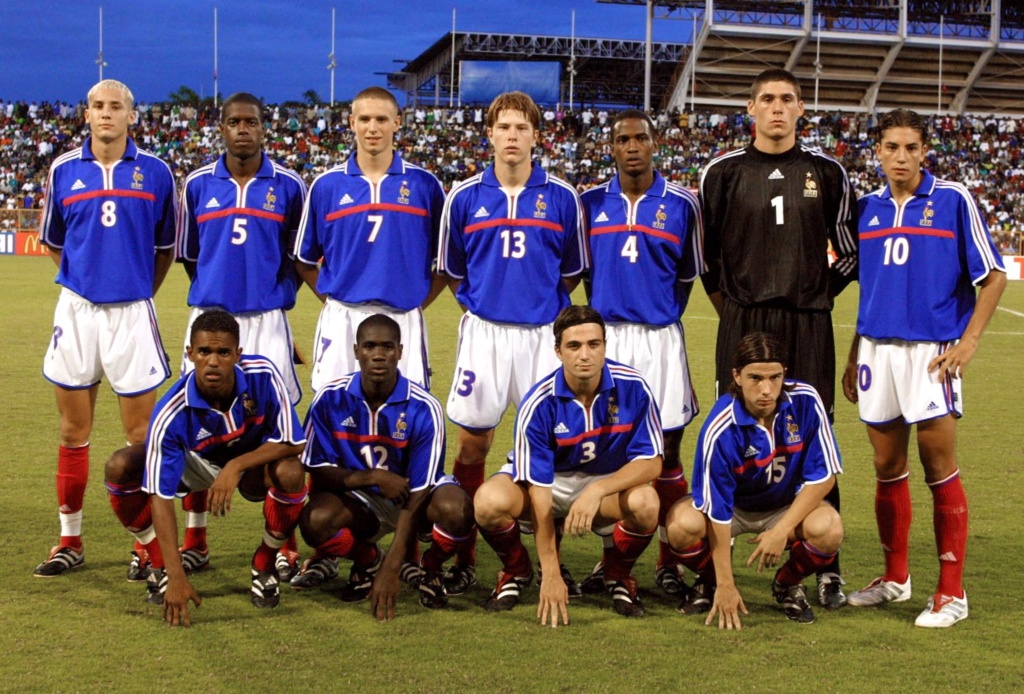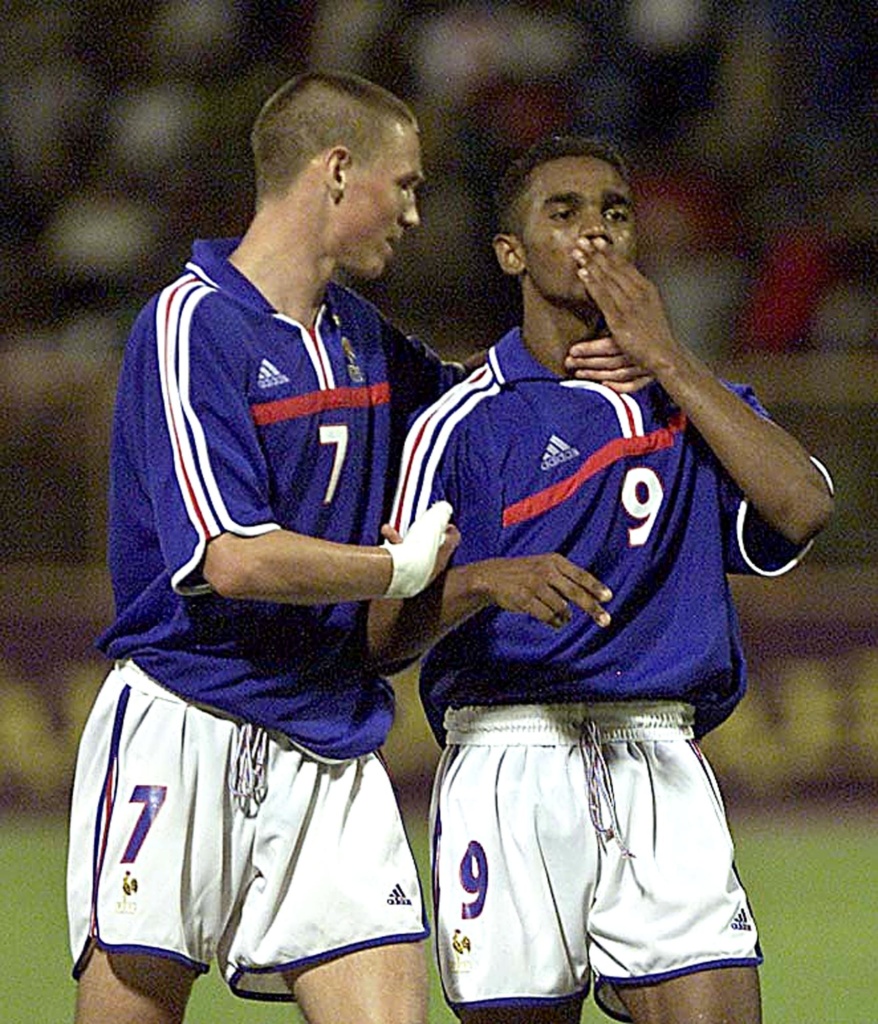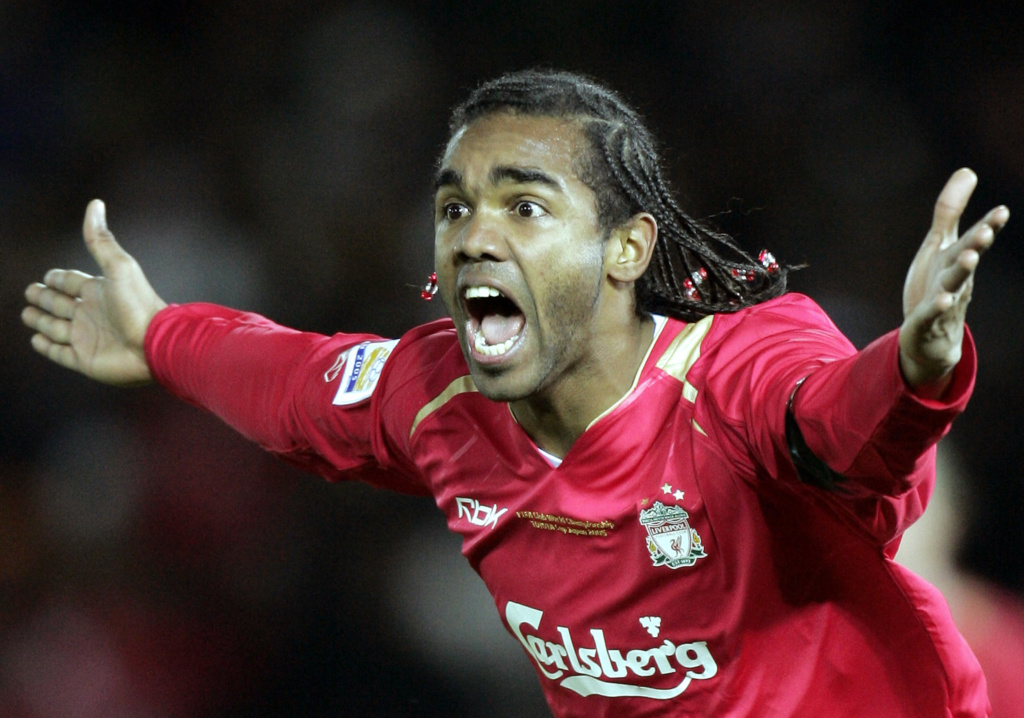At just 19, Florent Sinama Pongolle and Anthony Le Tallec made the long trip to Anfield

First published:
https://scroll.in/field/853546/from-2001-u-17-world-cup-to-liverpool-the-story-of-florent-sinama-pongolle-and-anthony-le-tallec
From 2001 U-17 World Cup to Liverpool: The story of Florent Sinama Pongolle and Anthony Le Tallec
The two cousins struck a partnership which was instrumental in France’s success and took both to Anfield at just 19
On Sunday, France got their campaign underway at the Fifa Under-17 World Cup with a 7-1 thumping of debutants New Caledonia in Guwahati. They hardly broke sweat, dominated proceedings and geared up for the tie against Japan on Wednesday, which is likely to seal top spot in Group E for the victor.
Winning the opener of a major international tournament augurs well for the confidence of any team; more so, if they are teenagers playing their first major cup. Back in the 2001 edition of the tournament, though, it was all very different for the French.
A lot was expected of them, having finished runners-up at the under-16 Euro Championship earlier that year. Across the pitch, though, was a gritty opponent in Nigeria, who were two-time winners of the tournament and had also clinched the African U-17 Championship a few months ago.
In a closely fought encounter, the Nigerians prevailed 2-1. On the scoresheet for France was a 16-year-old Florent Sinama Pongolle. And it only made him more determined to bounce back from the opening loss.
***

Life for Sinama Pongolle revolved around football while growing up on Reunion Island – a French territory in the Indian Ocean, east of Madagascar. It was just something they indulged in after school – either playing for hours or sitting on the sidelines, watching the older boys in action. On weekends, it was a routine for the folks from Saint-Pierre to step out and spend the day following the local league matches, while also indulging in a mini party that unfolded off the field.
“It was a closely-knit community,” said Sinama Pongolle. “Everyone was family and everyone was friend. Football was the No 1 sport and it was natural for any kid to take it up. The players were quite good and the atmosphere was incredible – really encouraging for a youngster.”
It was a long walk each day to the ground, a 10-km hike to and fro, in order to play with boys his age. Soon, he had made an impression and turned out for the juniors at local club Saint-Pierroise. When Sinama Pongolle was just 10, a tournament changed his fortunes and that of France in the years to come.
In the early 90s, the junior side of French club Le Havre visited Reunion Island for a local tournament. On that team was one Anthony Le Tallec, only a few days older to Sinama Pongolle and hungry for goals just like him. The two boys squared off in the final, where Sinama Pongolle’s side prevailed in the penalty shootout. At the prize distribution, Sinama Pongolle was handed the top-scorer prize while Le Tallec was declared the best player.
“After the ceremony, we made a few pictures, and I got talking with his father,” Sinama Pongolle said. “When he heard my family name was Sinama Pongolle, he probed further. Soon, we realised that Anthony and I were closely related, which made us cousins. It was strange and funny at the same time because before this, I had no clue about a cousin my age, who lived in France and also played football.”
It was a reunion born out of a chance occurrence and a freak coincidence, quite out of the blue. Little did they realise then, that this was to be a partnership cutout for the long run.
***
Sinama Pongolle had been on Le Havre’s radar for a few years. At the age of 11, they asked his folks about the possibility of moving to their facility in north-west France and joining the club. Luckily for Sinama Pongolle, he now had family there in the Le Tallecs, and he soon packed his bags and moved thousands of miles away from home to start a new life in a strange land.
Despite having Le Tallec for company on and off the field, Sinama Pongolle had a tough time settling in. The stark difference in culture in the two places is what made him really glum.
“I have memories of spending so much time with family back home – just so special,” he said. “People knew each other and there was always something to talk about. It was just less warm in France in my opinion, that homeliness was missing. I was quite miserable during those early months. I did miss home but then again, I knew why I was there.”
On the field, though, a deadly partnership was slowly brewing. In the frontline at Le Havre, Le Tallec was making an impression in the box while Sinama Pongolle’s pace was leaving defenders for dead. While away from football, the two became close buddies.
“We started off with cards in the room we shared, but soon knew each other thoroughly,” said Sinama Pongolle. “I could read his game, knew exactly what he would do next; so we were two people but essentially one.”

The scouts had their eye on the duo and during their U-16 days, the two earned their first call-up for France at the same time.
“It was a game against Germany. Anthony had a good game, but I had a terrible one. So while he became a permanent fixture, I was out of the reckoning for the next six months. Had it not been for an injury to another player, just before the Euro U-16 championships in 2001 in England, things would have panned out very differently for me. It’s the story of football – anytime, anything can happen.”
That tournament changed both players’ fortunes. In a group that featured Croatia, Scotland and Finland, France finished atop without conceding a goal, with Sinama Pongolle scoring four, while Le Tallec got three. Though they failed to make the scoresheet in the 2-0 quarter-final win against Russia, they were back in business with two goals each in the 4-0 hammering of England in the semi-final. In the final, Fernando Torres’s lone goal for Spain robbed France of the title and Sinama Pongolle of the Golden Boot award, as he finished with a tally of six goals – one short of the Spaniard.
But the big clubs had seen the chemistry between the two French lads at work, and soon, the heat was on to bag their signatures.
“I visited England with my agent,” said Sinama Pongolle. “I went to Arsenal, saw their facility and met with Arsene Wenger – this was a club I was really keen on signing with. But when I went to Liverpool, and saw the number of French players there, including manager Gerard Houllier, I found my comfort zone. They had won so many things at that time. Besides, Anthony had also told me he was seriously considering joining them.” .
In the next four months, the English giants had made a temporary agreement with Le Havre to hire the services of the two youngsters. How they would perform at the U-17 World Cup in September would seal the deal.
***
As finalists of the U-16 Euro earlier that year, France made the cut for the U-17 World Cup in Trinidad and Tobago. However, it started off on a disastrous note with the loss against Nigeria.
“We knew Nigeria was going to be tough, since they are a powerhouse at the junior level,” said Sinama Pongolle. “After that, we were focussed on bagging the second spot in order to qualify to the knockouts.”
Sinama Pongolle opened the scoring against the United States, and went on to score a hat-trick in the 5-3 win. The golden touch continued as they mauled Japan 5-1, with Sinama Pongolle notching up his second hat-trick en route. He was now the top-scorer of the tournament.
“It’s hard to choose from the two hat-tricks but I think the one against Japan was harder. USA was not really in a mood to be there because of 9/11, which had occurred just a few days before the tournament.”
As the second-placed team in Group B behind Nigeria, France qualified for the quarter-finals, where they had a demanding fixture against defending champions, Brazil. In a span of two minutes, though, France were in the driver’s seat with goals through Sinama Pongolle and Le Tallec. Though Brazil pulled one back, France held on to march into the semi-final against Argentina.
“That win was special because during the two years before the U-17 World Cup, we usually lost to the South Americans. They had great maturity in their game, so you had to be at your best to match up to their level. I remember when I got the first, there was relief all around and it helped us focus better on the field.”
Against Argentina, Carlos Tevez opened the scoring in the second half. But another two-minute blitz from Le Tallec and defender Jeremy Berthod sealed a final berth for this golden generation of French teens. On the other side was an opponent France was all too familiar with – Nigeria, whom they had lost to in the opening match of the tournament.
“We probably had more difficult games en route the final (Nigeria beat Australia and Burkina Faso in the knockouts) – to beat Brazil and Argentina in regular time, it gives you confidence. These were stressful matches, really intense. Psychologically, we were better prepared. I had scored eight goals and was relaxed before that match.”
That conviction was on ample display. Sinama Pongolle opened the scoring, while Le Tallec scored on the other side of the half. When Samuel Pietre struck the third nine minutes from time, France sat pretty, having sealed their first U-17 World Cup title. With nine goals to his name, Sinama Pongolle not only won the Golden Boot, but was also handed the Best Player award.
Sinama Pongolle and Le Tallec had justified their billing as the rising stars of France. The riches of England beckoned the pair, as Liverpool bagged their boys in 2001.

After the signing, the two were sent back on loan to Le Havre for a couple of seasons, until they returned to Liverpool in 2003. Whether it was due to a plethora of striking options or otherwise, the opportunities to play were hard to come by.
Sinama Pongolle’s stint with the Reds is best remembered for a crucial strike during their Champions League campaign in 2005-’06. To qualify for the knockout stages, Liverpool needed a two-goal margin of victory against Olympiakos in the final group game.
Trailing to a Rivaldo free-kick, super sub Sinama Pongolle’s equaliser got things underway for Liverpool, who not only won 3-1 on the night, but went on to lift the trophy that season against all odds.
***
These days, Sinama Pongolle plies his trade in Thailand. He fondly remembers those junior days, when the world took notice of a young lad from distant Reunion Islands. The two tournaments gave him the perfect platform to showcase his skills, sending the football world in a tizzy having discovered their next big thing.
“It’s the beginning of everything to be honest,” he said. “All the clubs are watching you and the kids realise it. This can only be positive in the long run. You never know what it can lead to.”
What shocks him, though, is the money being shelled out for these teenagers these days, given their age.
“At that time, there was no big money for teens that is being paid today. I think the amounts are ridiculous, because during this time, you are learning and still need to prove the fact that you are a professional. In football, talent is only 30% while 70% is all in your head – your mentality, responsibility and your discipline.”
The years around the turn of the millennium was a dream period for French football. When Sinama Pongolle’s team won the U-17 World Cup in 2001, the senior squad had annexed the World Cup in 1998 and the Euro in 2000.
If the French squad these days is anything to go by – the core consists of the likes of Kylian Mbappe (18), Ousmane Dembele (20), Anthony Martial and Kingsley Coman (both 21) – the current lot of French teenagers at the U-17 World Cup are a work in progress and hold great promise in the years to come. According to Sinama Pongolle, it’s a result of the work that was put in at the grassroots and the setting up of various academies over the years.
This may just be a good time to be a French football fan yet again.